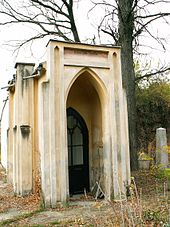Aaron Chorin
Aaron Chorin , also Áron Chorin (born August 3, 1766 in Mährisch Weißkirchen , † August 24, 1844 in Arad ) was a Hungarian rabbi and a former supporter of religious reform .
Life
As a 14-year-old Chorin took a two-year study at the yeshiva of Mattersdorf on which he Ezekiel Landau in at Rabbi Prague continued where he also acquired knowledge of general philosophy, learned the German language and an interest in the Kabbalah developed. In 1783 he married and tried unsuccessfully to establish himself as a trader. In 1789 he was appointed Rabbi of Arad and held this office until his death. In 1803 he published his book Emek ha-Shaweh in Prague , in which he attacked those customs which, according to his declaration, had no basis in Judaism, justifying his reforms with guidelines from the Talmud . The book sparked a storm of indignation in ultra-Orthodox circles and was viewed as heretical . Mordechai Bauer from Nikolsburg asked the community in Arad to ban the book ("Cherem"). Chorin was summoned before a rabbinical court , according to whose judgment the book should be burned and Chorin demanded a written revocation. However, Chorin appealed to the Hungarian government, whereupon the judgment was overturned.
The most important innovations in Chorin concerned the synagogue liturgy . He changed the text of some prayers, removed the Kol Nidre prayer , allowed prayers in the national language without headgear, and allowed the organ to be used on Shabbat . He also allowed riding and writing on Shabbat and shortened the seven days of mourning after the death of a family member ("Shiva"). As a staunch fighter for secular education and for the improvement of the social and cultural status of the Jews in Hungary , he called for the construction of a rabbinical seminary and a school where Jews should acquire technical and agricultural knowledge. In his article Kinat ha-Emet ("The Jealousy of Truth") he supported the reforms introduced by Israel Jacobson . In Dawar be-Itto ("A word in its time", Hebrew and German 1820) he emphasized that the love of God and humanity took precedence over the positive commandments ; his article Hillel , written in the form of a dialogue between Rabbi Hillel and his student Jochanan ben Sakkai , is written in the same spirit. In orthodox circles he was contemptuously referred to as Acher ("another"), which is firstly an acronym for his name Aaron Chorin Rabbi and secondly as a nickname for Elisha ben Abuja after his apostasy .
photos
literature
- Constantin von Wurzbach : Chorin also Choriner, Aaron . In: Biographisches Lexikon des Kaiserthums Oesterreich . 2nd part. Publishing house of the typographic-literary-artistic establishment (L. C. Zamarski, C. Dittmarsch & Comp.), Vienna 1857, pp. 356–358 ( digitized version ).
- Leopold Löw , Aron Chorin. A biographical sketch.
- Encyclopaedia Judaica , Vol. 5, pp. 495-496
Web links
| personal data | |
|---|---|
| SURNAME | Chorin, Aaron |
| ALTERNATIVE NAMES | Chorin, Áron |
| BRIEF DESCRIPTION | Hungarian reform rabbi |
| DATE OF BIRTH | August 3, 1766 |
| PLACE OF BIRTH | Moravian Weisskirchen |
| DATE OF DEATH | August 24, 1844 |
| Place of death | Arad |



